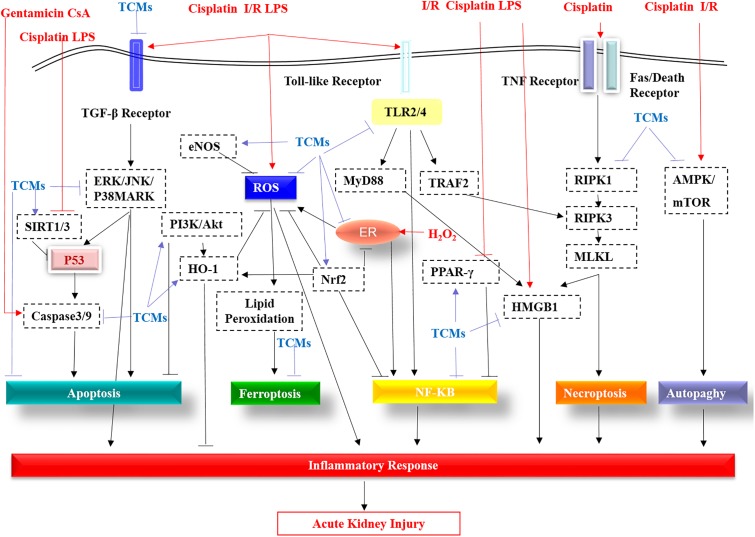FIGURE 1.
The molecular pathways targeted by the TCMs covered in this review are summarized. TGF-β receptor, Toll-like receptors (TLRs), TNF receptor, and FASL/Death receptors are stimulated by LPS, cisplatin, I/R, etc. These receptors are then activated by the downstream pathway, further triggering ROS production and an inflammatory response, eventually leading to kidney damage. TCMs suppress cisplatin/LPS/I/R-stimulated Toll-like receptors (TLR2/4), or by activating PPAR-γ, further inhibiting the NF-κB pathway and reducing inflammation. Additionally, apart from targeting caspase3/9, TCMs reduce apoptosis by inhibiting the TGF-β receptor, the ERK/JNK/P38MARK pathway and by promoting PI3K/AKT. In addition, TCMs inhibit autophagy by targeting inhibition of AMPK/mTOR. In addition to the traditional apoptosis, autophagy, programmed necrosis and ferroptosis are also caused during AKI. Wogonin and protocatechuic aldehyde can effectively inhibit RIPK1 in the RIPK1/RIPK3/MLKL of necroptosis. TLR2/4-mediated TRAF2 has a stimulant effect on RIPK3. Induction of HMGB2 by necroptosis and TLR2/4-regulated MyD88 aggravates the inflammatory response of acute kidney injury, while TCMs significantly improve this phenomenon via direct or indirect effects. Breviscapine can reduce ferroptosis by increasing glutathione peroxidase levels. In acute kidney injury, the production of ROS, the multiple roles of P53, the protective effects of eNOS, Nrf2, HO-1, and SIRT1/3 all become therapeutic targets of TCMs.

